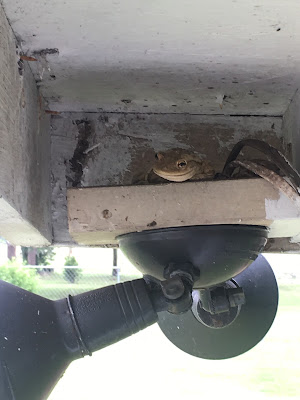How’ve you been, NIP?
I hope that
you’ve been awesome. Whenever someone asks my brother-in-law some derivation of
the same question (how are you?, etc.), he always replies with “awesome.” I
love that answer, even if he only means it in the more colloquial sense that the
term has taken on in the last 30 years or so. But when I say that I hope you’ve
been—and continue to be—awesome, I mean it in the literal, original sense of
the word. I’ve been thinking about how awesome my life is as of late,
especially this past Memorial Day weekend. Plus, reflecting on the previous
letter about L.U.G., I don’t think I talked about the aspect of awesomeness
that imbues much (if not all) of what makes L.U.G., L.U.G. So I wanted to
rectify that by writing this short letter to you today after thinking about
it yesterday while I was mowing my father-in-law’s lawn.
I’m not going
to lie, I love to mow lawns. Always have. Can’t quite put my finger on it, but
the most prominent feature that I keep coming back to when I explain to others
is the solitude. When you’re mowing the lawn, no one is going to disturb you
for virtually any reason. Much like when I run, I can use that time to think or
to just be, and usually it ends up being a combination of both—times when I
slip into thinking and reflection, and then out of it into simply being and
focusing on the various sensations within my field of consciousness. While I’m
mowing the lawn, though, it tends to be more of the latter rather than the
former, and I think it has a lot to do with the connection to nature (or L.U.G.
more broadly). Whatever the reason is, it hit me big time when I was mowing
yesterday.
 |
| It might not be Montana, but Plant City is definitely "Big Sky Country" |
When I first
crossed the fence-line yesterday to the back parcel, I stopped to just take in
the sky. The clouds were billowing outward yet pockets of sunshine spotted the
ground from the light streaming through, and in the distance you could feel
rain coming from the north behind me as the breeze blew to the southeast. I sat
there on the mower for a long moment, taking it in, and I really didn’t have
words. When these moments hit me when I am truly awestruck, I can feel them
rising. It’s as if I become one with the very thrumming heartbeat of L.U.G. It
left me after a moment once I began mowing in earnest, but after about three
loops around the fencing and a solid border had been established, about a dozen
cattle egret joined me in the grass. They took turns flying down from the fence
posts and into the freshly mown grass to scarf up the insects whose habitats
had been briefly disturbed by the grass being cut. I watched them for several
moments as they ran about, swooping up and out of the way as the mower passed,
until finally I just stopped altogether and sat there taking in this amazing
sight. After a few moments they had made their way through the property and had
moved on to the adjacent one, but the feeling of awe stayed with me for the
rest of the time I mowed.
 |
| Cattle Egret. In case you've never seen one and were dying to know. |
I think there
is a direct connection between the capacity to cultivate awe in our daily lives
and our overall life satisfaction. I hesitate to use the word happiness here
because that might be too glib. There is something about awe when you are
feeling it in the moment that doesn’t quite connote happiness, but the feeling
itself is pleasurable. It’s definitely a reverential feeling, something that
makes you feel truly grateful to be alive and bask in the “is-ness” of that
specific moment. That’s not to say that awe can’t make you also feel something
akin to fear and a certain recognition of smallness in terms of scale when
contemplating one’s place in the cosmos, but most of the time when it does
arise for me it tends to be of the more pleasurable variety. But this
connection then begs the question: how do we cultivate our capacity for awe?
For me, it
has been mostly my mindfulness meditation practice. For nearly seven years now
I have meditated every day, constantly calling myself back away from my
auto-pilot brain mode to paying attention to what is happening to me in the present moment. That, coupled with a true recognition of my ignorance
about the world and how it works, has instilled in me this capacity for
recognizing awe when it arises. While I wish I could turn it on and off like a
switch, I can’t. What I do know, though, is that these moments rise up to greet
me in the present much more often than they did before, almost as if L.U.G.
knows exactly when to blossom its petals outward and let me take a peek into
its esoteric nature. We all can learn how to do this—or perhaps re-learn—because each and every one of
us did it when we were young. The reason why we stop has a lot to do with our
nature, and we have to learn to override this impulse by constantly being on
the lookout for the awesomeness that is right in front of us in most moments.
Do you
remember what it was like to be young, NIP? I don’t mean in your teens or even
twenties, I mean younger than ten years old. I’m sure you do, and I am sure you
have fond memories from that phase of your life. Or, even better, if you have
children of your own, you’ve seen their natural capacity for awe in them when
they interact with just about everything in life. I used to call it “innocence”
when I was younger, always lamenting the loss of it because for the first ten
years or so of our lives nearly everything
is wonderful. Do you remember that? That constant need to explore? To try out
new and different things? Everything was so novel, so new. We lived in a state
of amazement precisely because we hadn’t experienced it, or at least not in
that particular way in that moment we remember so much. Now that I’m 40 and
have learned a lot more about life—especially the human brain—I realize that it
is not innocence that we lose as we grow older, it’s that we become habituated.
Habituation
is good insofar as it keeps our species (and perhaps all animals) safe. But
there is a real sense in which becoming habituated to life within a certain
context can deaden our spirits and strip away what makes us truly feel alive.
After all, the way the field of psychology defines habituation is the lessening
of a physiological or emotional response to repeated stimuli. We come to accept
a certain routine to our daily lives, a familiar pattern. But in so doing we
also start to take it all for granted. Ultimately, what these last few years
have taught me is that by fighting to see the newness and uniqueness in those
moments when I am willing to actively search for them in a given moment, we not
only become more grateful as we take less for granted, but we also build up a
reservoir of awe that we can tap into more frequently, reinvigorating the
childhood exuberance we once felt for living life to the fullest and being a
part of something much bigger than ourselves.
 |
| Though it's difficult to tell, this Tree frog looked like a small Bull frog. |
I spent the
better part of the afternoon thinking about these things as I took in the view
from the back porch of my father-in-law’s house. I watched two baby doves land
on the lip of the birdbath to clean themselves before flying away. I watched a
long black snake wind through the grass out into the shade of the Plumbago bush
before finally being chased out of there by a protective mockingbird. A bright
red cardinal next landed on the birdfeeder and ate his fill, dropping small
bits of seed in the process. In between these sights I shared stories and
smiles with family…and I felt awesome. I felt great to be alive, to enjoy these
simple moments and to recognize them for the gifts that they are. On the drive
home, a quote that I stumbled upon while re-reading Marcus Aurelius’ Meditations came to me, and I will leave
it here for you to further contemplate as you try to incorporate more
awesomeness into your own daily life, NIP.
When
you arise in the morning, think of what a precious privilege it is to be alive—
to
breathe, to think, to enjoy, to love.
Stay awesome,
- Ryan


